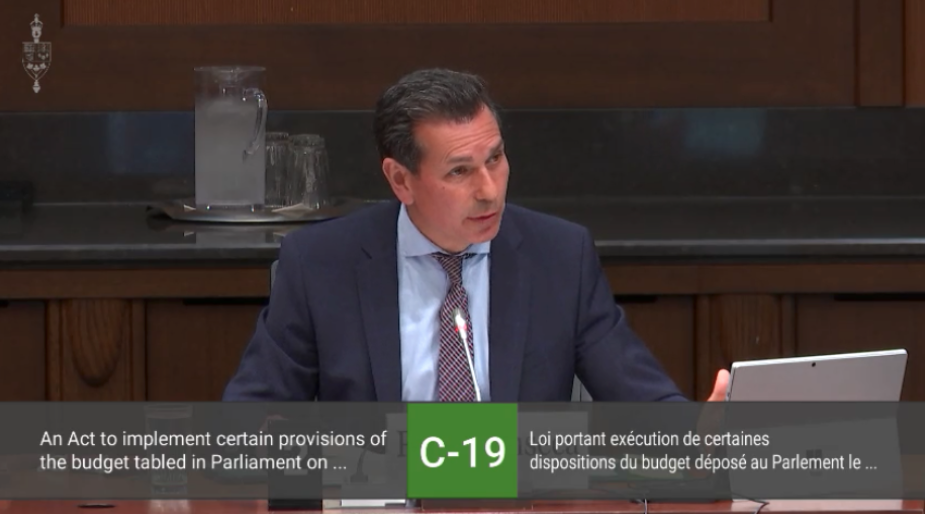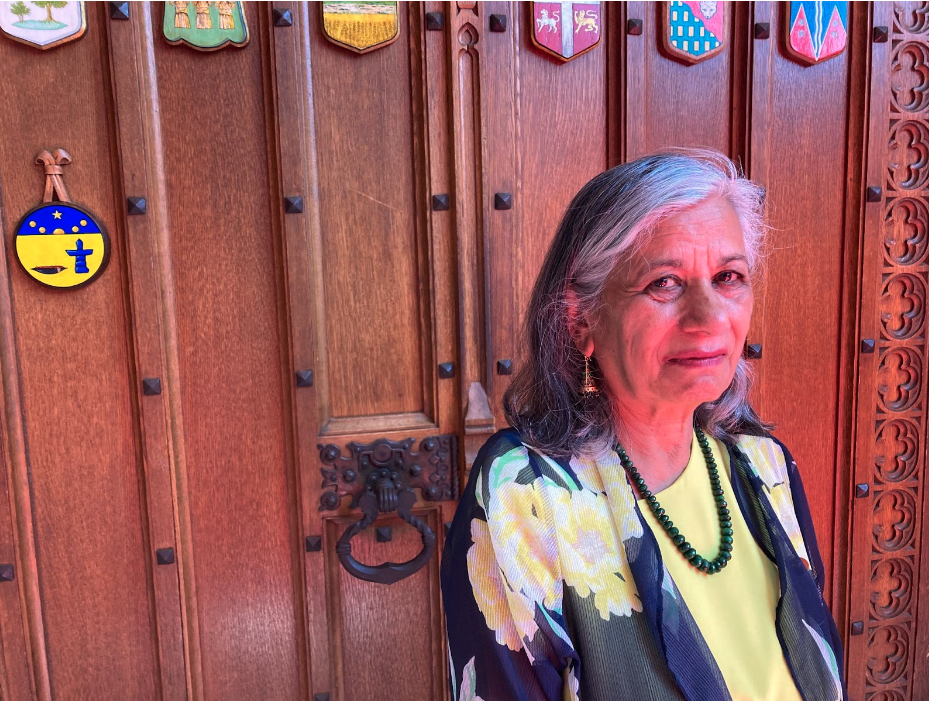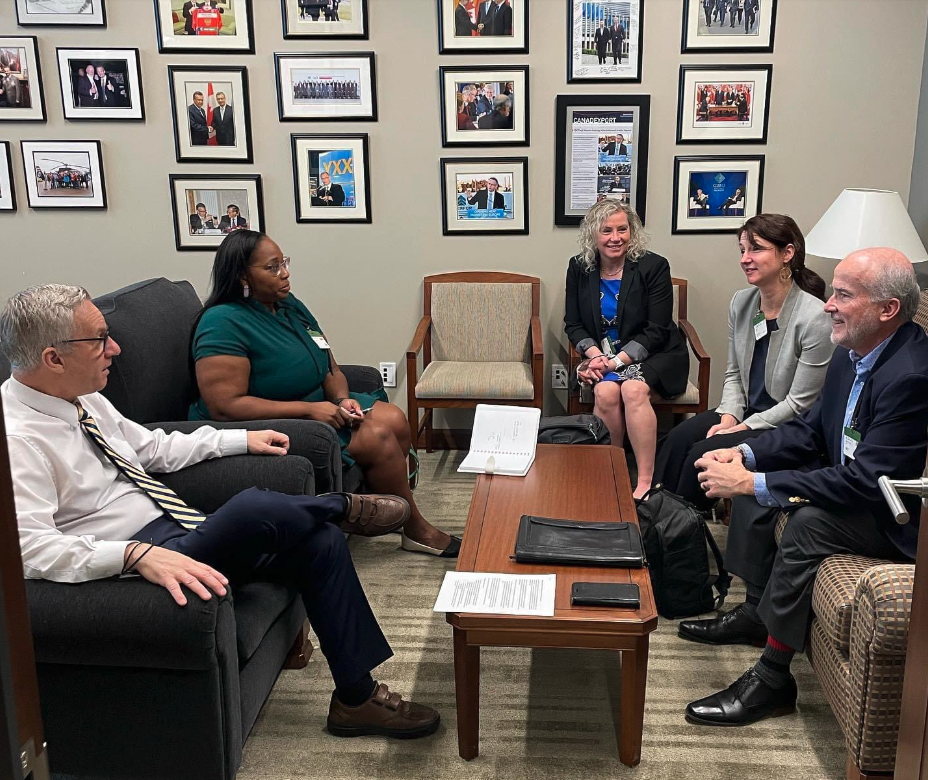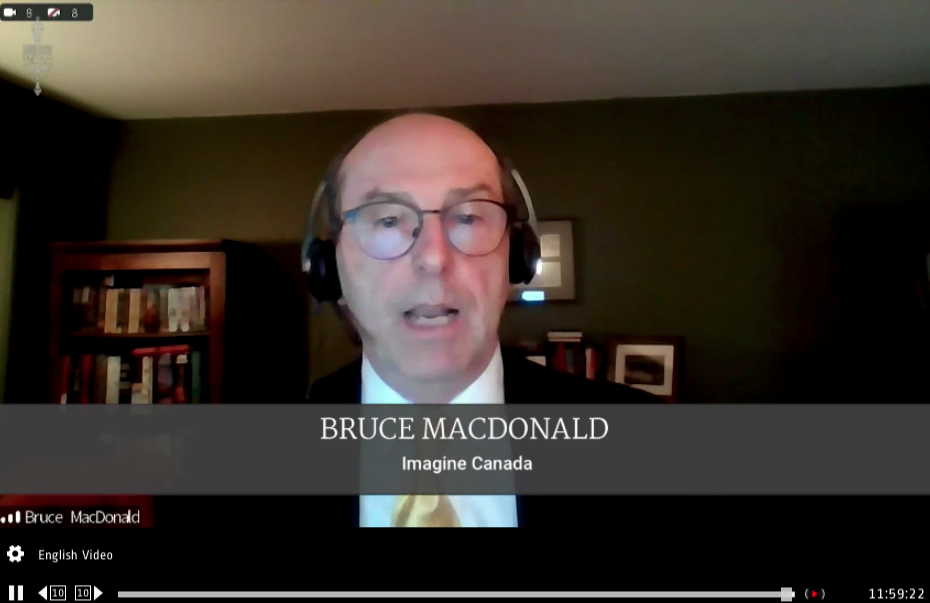Inside the rapidly organized ‘Hill Day’ for a legislative amendment on non-qualified donees
Why It Matters
As soon as this week, the government could pass legislation that, sector advocates say, would make it harder for charities and foundations to fund non-profits, grassroots groups and international charities — directly contravening a promise made in the federal budget.

This journalism is made possible by the Future of Good editorial fellowship covering the social impact world’s rapidly changing funding models, supported by Future of Good, Community Foundations of Canada, and United Way Centraide Canada. See our editorial ethics and standards here.
Tanya Hayles’s frustration over non-profit funding woes took her from Toronto to Ottawa last week.
Hayles is the founder of Black Moms Connection, a non-profit she started in 2015 dissatisfied with the lack of diversity in parenting groups. The initiative began as a Facebook page, but membership took off the following spring, growing from 400 to 4,000, fuelled by the swelling Black Lives Matter movement and the increasing outrage over the shooting death of Trayvon Martin.
“[Mothers] needed to be able to say, ‘Here’s how I’m feeling. I’m afraid for my family.’ And they needed to not be told that they’re ‘playing the race card,’” said Hayles, in an interview on Monday.
Hayles knew the demand for support was more than a Facebook group could offer. So in 2016, she established the group as a non-profit with plans to offer more culturally-relevant support for Black mothers.
Six years later, that’s exactly what they do — with financial literacy workshops, emergency rent support and storytelling content for an engaged global community of over 25,000. But despite a big increase in their activities, there hasn’t been a similar surge in organizational funding, said Hayles. As a non-profit, the group is ineligible for most foundation and government funding and has had to rely on project grants or awards for funding. (To launch their COVID emergency fund, for instance, Black Moms Connection relied on a $10,000 leadership award Hayles received from L’Oreal Paris Canada).
“I have to operate with one hand tied behind my back because of rules that foundations can’t give to non-profits or ‘un-qualified donees,’” said Hayles. “It’s really insulting, because nothing about me is ‘not qualified’. I’m very qualified. I’m doing the work. I’m talking to the people who need us. And I’m finding solutions.”
Hayles brought that message to Parliament Hill last week, flanked by a dozen charity sector colleagues. Their mission was straightforward: to lobby for an amendment to legislation the government is on the cusp of implementing that, they say, would make it more challenging for charities to grant to non-profits, grassroots groups and international charities.
This is the latest step in a more than four-year struggle on this issue, and one that sector advocates say, the government is close to getting wrong.

BIA is current “direction and control” guidance “on steroids”
Sitting on a bench just outside the senate chamber on Wednesday, Senator Ratna Omidvar was composed, but visibly frustrated.
For more than three years, Omidvar has pushed to try and make it easier for non-profits to get money from Canadian funders. In 2019, after a senate report called for legislative change on this issue, she tabled private members Bill S-222 aiming to do just that. The bill had strong support, but the government was progued so she was forced to start “all over again,” she said.
Bill S-216 has been her second crack at it. With patience, she’s steered the private members bill through the Senate and through its first reading in the House of Commons.
All was well on track until April 7, when the Liberal government issued a surprise announcement in their annual budget: they too saw the importance of making it easier for non-profits to access support, and would take up Omidvar’s charge, implementing “the spirit” of her bill in their own legislation.
“We were all really thrilled,” she said. “The best outcome [for any private member’s bill] is when the government says, ‘This is a sensible idea, I’m going to put it into my platform.’”
Omidvar and many sector advocates were also encouraged by what this would mean for the implementation timeline for the new legislation. (Every private member’s bill must undergo two years of consultation before it becomes law. Not so for legislation tabled by the government, which comes into effect immediately.)
But what initially seemed like the best part of the government’s budget promise to act on Bill S-216 has come to seem like a curse.
In late April, the government released the Budget Implementation Act (BIA) — draft legislation to fulfill this and other budget promises. Omidvar hadn’t been consulted on the language, nor had other sector associations like Imagine Canada or Philanthropic Foundations Canada.
And upon reading the text, Omidvar was awestruck, realizing that the legislation would actually make it harder for non-profits to access funding, she said — a reality which would come into force immediately once the bill is given royal assent.
Under the current regime, the Canada Revenue Agency (CRA) issues instructions on how charities can work with non-profits in their “guidance” documents. By being in the guidance rather than the law, charities have some flexibility on how to achieve their stringent “direction and control” responsibilities with their non-profit partners — whether they ask for an annual written annual report or a bi-annual verbal one, for instance.
The BIA, however, would kill this flexibility, said Omidvar: “They have actually transported the direction and control guidance, put them on steroids and put them in the regulation.”
And, to make matters even clearer, the legislation clarifies that if the BIA passes, Omidvar’s Bill S-216 will be deemed “moot,” she said. “They really don’t like my bill.”
A rapidly organized Hill Day to urge an amendment
Sebasian Muermann was biking home from a work meeting in Toronto on April 26, when his bluetooth earbuds read out an email about the BIA. “I knew then…all of our priorities would shift for the next couple of weeks,” said Imagine Canada’s manager of government relations, at a cafe in Ottawa on Thursday morning.
After an initial read of the draft bill, his organization sent it to a group of about 40 charity lawyers and asked for their take. The lawyers already had skin in the game. In February 2021, they penned an open letter to the government, advocating for changes aligned with Bill S-216.
In the letter, they called on the government to get rid of the “own activities” requirement — Income Tax Act language that stipulates that when a charity works with a non-qualified donee (any organization that’s not a registered charity) they must structure the relationship such that a court would consider their partner’s work to be the charities “own activities.”
This requirement creates a “top down” and “paternalistic” system, the lawyers argued, which forces charities to lord over their non-qualified donee counterparts. They urged the government to swap their “operational accountability” regime for one focused instead on “expenditure” or “resource accountability.” This, they suggested, would actually make charities more accountable, not less.
Upon review of the BIA, the lawyers told Imagine Canada that the draft legislation could pose a number of new issues. Though the government had dropped the “own activities” language, they swapped in new language — language that hadn’t been in the much-considered Bill S-216.
Jean-Marc Mangin, CEO of Philanthropic Foundations Canada said, in an interview on Monday, that the new requirements could confuse funders, making it less likely that some might partner with non-profits or grassroots groups.
“Most foundations do not have staff. They are volunteer driven. They don’t have a charity lawyer at their fingers to advise them,” he said, suggesting that without adequate resources to interpret the new legislation, some might not bother at all.
Concerned by these possibilities, Imagine Canada assembled a team to get in front of as many MPs in Ottawa as they could. Bruce MacDonald, Imagine Canada’s CEO, reached out to Hayles, asking if she was available to join. “He was like, ‘The MPs need to hear from you,’” she said. After a chat with her board, Hayles said “Yes,” and booked a train ticket to the nation’s capital.
Representatives from nine other organizations joined her, including staff from The Circle on Philanthropy, Foundation for Black Communities, McConnell Foundation, Cooperation Canada, the Network for the Advancement of Black Communities and Philanthropic Foundations Canada.
The McConnell Foundation provided Imagine Canada with funds to hire a government relations firm to identify and set up meetings with key political officials. And with more than two dozen meetings on the books, the group headed to Ottawa.

Government ‘trying to find the right path forward’
In the nation’s capital, on unceded Algonquin territory, the group of twelve split into teams of three, each winding their way through a maze of government buildings to meet with MPs and make their pitch for an amendment.
Hayles was anxious — “I’d never participated in such a thing,” she said — and reasoned that she needed to try and make things as real and relatable as possible for the MPs who are making decisions that will have sweeping impacts on communities across the country.
The group’s advocacy strategy was two-fold. First, to get in front of as many decision-makers as possible; and second, to build support for an amendment across party lines. In the event the Liberals don’t propose an amendment, advocates are hopeful they can count on the support of the Conservatives, NDP and Bloc Québécois.
Power players for this file are Liberal Cabinet ministers, the Ministry of Finance and the members of the standing committee on finance — as it’s there that any amendment would be introduced.
Hayles’ group got in front of several key power brokers, including two Conservative finance committee members and MPs: Adam Chambers and Ed Fast. Hayles said that regardless of party affiliation, the politicians they met with took the time to hear them out and listen to their concerns. She also said her group was dynamo.
“Once we got the rhythm of our first couple of meetings, we were like a well-oiled machine,” she said. “We were hitting them from all angles…it was amazing.”
In the meetings, Hayles pushed politicians to think of non-qualified donees in a new light: “When we talk about grassroots, it’s sometimes used in not a nice way. It’s kind of like, ‘Oh, you’re small and tiny and you don’t have any money and you don’t have any people,’” she said. “But grassroots means that you’re on the ground and you’re tending to the lawn and the lawn is the community.”
In neighbouring buildings, her colleagues from the other two groups were also making headway. In total, over four days, the advocacy team met with representatives from the offices of 25 MPs, including staffers from the offices of the Prime Minister, Minister of Finance, and Minister of the Official Opposition. Charity advocates also met with the president of the Treasury Board, Mona Fortier, and Minister of Environment and Climate Change, Steven Guibeault.
Via Zoom, Minister Guibeault told another charity lobby team he’d spoken with staff from the Ministry of Finance in advance of their meeting, and that they seemed to be “quite seized” with the issue and were “trying to work to find the right compromise.”
He said he didn’t get the feeling that ministry bureaucrats were trying “not to do what you were asking” and that they were working to “find the right path forward.”
By email, a spokesperson for the Office of the Deputy Prime Minister and Minister of Finance said the country’s tax rules should “support the work of Canadian charities and minimize their administrative burdens, while still ensuring accountability for how charitable resources are used.”
She said “the government is committed to supporting these objectives, while allowing greater flexibility for charities to support non-profit groups that may not have the ability to pursue charitable status of their own and will continue to work with them on this matter.”

On tenterhooks hoping for an amendment
By Friday, Hayles was back in Toronto. Her knee was sore from the train ride and she had a mountain of work to catch up on, but she felt optimistic about the path ahead for the BIA.
“If it gets passed, if it’s in the Act…it will be very difficult, and almost impossible to remedy,” she said. “[But] I feel hopeful that the party in power is going to see the error of the BIA and make the amendments…or [that] the other parties will use this to their political advantage to get it done.”
In recent days, the Ministry of Finance has also been in touch with Senator Omidvar, “working closely and collaboratively” with her, according to a ministry spokesperson, to ensure the country’s tax rules balance accountability and flexibility.
On Monday, Bruce MacDonald spoke to members of the standing committee on finance, as part of the bill’s second reading. He urged them to use their influence to make the change. Two members of the committee, Bloc Quebecois MP Gabriel Ste-Marie and NDP MP Daniel Blaikie asked questions: What would be the impact to the sector if it didn’t change? Could an amended bill be taken advantage of by “bad actors”? And what language did Imagine Canada hope to see in the amendment? They also both signaled some measure of support for an amendment.
On the same day, in the House of Commons, Omidvar’s Bill S-216 was also debated. The Bill’s sponsor, Conservative MP Philip Lawrence, pushed his colleagues to pass Bill S-216, noting that the BIA has fallen short of its stated objectives.
In subsequent days, the committee members will review the draft BIA clause-by-clause. It’s in these sessions that they have the potential to introduce an amendment, according to Imagine Canada. If an amendment isn’t added here, the final window will be during the third reading in the House of Commons.
In the meantime, the lobbying effort isn’t letting up. On Tuesday afternoon, Cooperation Canada, released an open letter, signed by 60 global development organizations, calling on the government to “fix the BIA.”
In it, the signatories make clear that what legislators decide over the coming days and weeks will affect social action in Canada and abroad for years to come.
“It will be interesting to see who was being genuine,” said Hayles, of her meetings with politicians in Ottawa. “I’m just hopeful that they’ll see the long-term consequences and make the amendments.”
This story has been corrected. A previous version mistakenly wrote that the Mastercard Foundation was part of the group of organizations lobbying for changes to the BIA.
